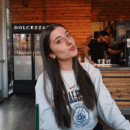Growing up, I spent countless evenings peeking out from beneath my mother’s covers to watch reports from my home city of Gaza on TV. It wasn’t out of the ordinary for me to hear bombs blasting from newscasts while I got ready for school. I became used to the look of distress on my father’s face while he tried to figure out whether our family members survived the airstrike of the week. I didn’t think much of this at the time; living in the United States with my parents and brother, while the rest of my family was back in Palestine, this was my normal.
But these experiences had a significant impact on me in a way you might not expect: While I didn’t know it at the time, they helped inspire me to become the journalist I am today.
I always admired journalism growing up, whether it was through watching these serious reporters explain what was happening in my home country, or writing about my day-to-day life for my 15 Instagram followers. My passion grew with me throughout the years, and it began to take shape in my freshman year of high school when I joined my school’s newspaper.
Through my positions as a staff writer and later editor, I was able to combine my two interests: writing and advocacy. I wrote stories about global injustices and mental health. I wrote about the local issues my town was facing and the inequities my peers were fighting. Coming from Palestinian and Algerian descent, I felt it was my destiny to tell stories that explored identities and help others.
But I was always very cautious when it came to writing about Palestine. I never wanted to give people another sob story to endure, or even worse, make myself the center of attention. Being one of the few Arabs in my entire school district, simply existing as a Palestinian student in the U.S. often felt like a controversy in itself. At the time, I didn’t realize how much my hesitance to embrace this part of myself through my work as a journalist was holding me back.

My mindset changed in May 2022, when Shireen Abu Akleh, a widely known journalist for Al Jazeera, was killed while reporting on a refugee camp in the city of Jenin; she was wearing her blue press vest at the time, which is supposed to protect journalists in armed conflicts. This shocking incident is what made me realize journalism was about more than just advocating for those who want to listen; I finally understood I had to take up the space that I was so intimidated by because my voice is a sign of resilience.
As the current situation has made things more dire than ever in Palestine, I am further inspired by Palestinian women journalists like Khawla al-Khalidi, who is currently reporting on the ground in Gaza. al-Khalidi bravely sent her children off to Rafah, where they sought refuge from these atrocities, while she stayed behind to continue reporting on the attacks in Gaza.
I also turn to those younger than me, like Lama Jamous, a 9-year-old girl who is reporting from Gaza. While my biggest issues as a journalist may be due to connection issues or technology malfunctions, Jamous sometimes struggles because her viewers can’t hear her over the airstrikes happening right above her. Jamous’s courage to do a job many adults couldn’t even fathom provides me with endless inspiration.
Because of the resilient women and girls like these, I dare to write about Palestine, as a proud Palestinian woman and journalist. Living in the U.S., I recognize that it is a privilege that I don’t have to worry about being murdered for my writing and reporting. I have to use that privilege to bring awareness to injustice and increase representation — hopefully, so I can one day share the same stages with little girls like Jamous.


